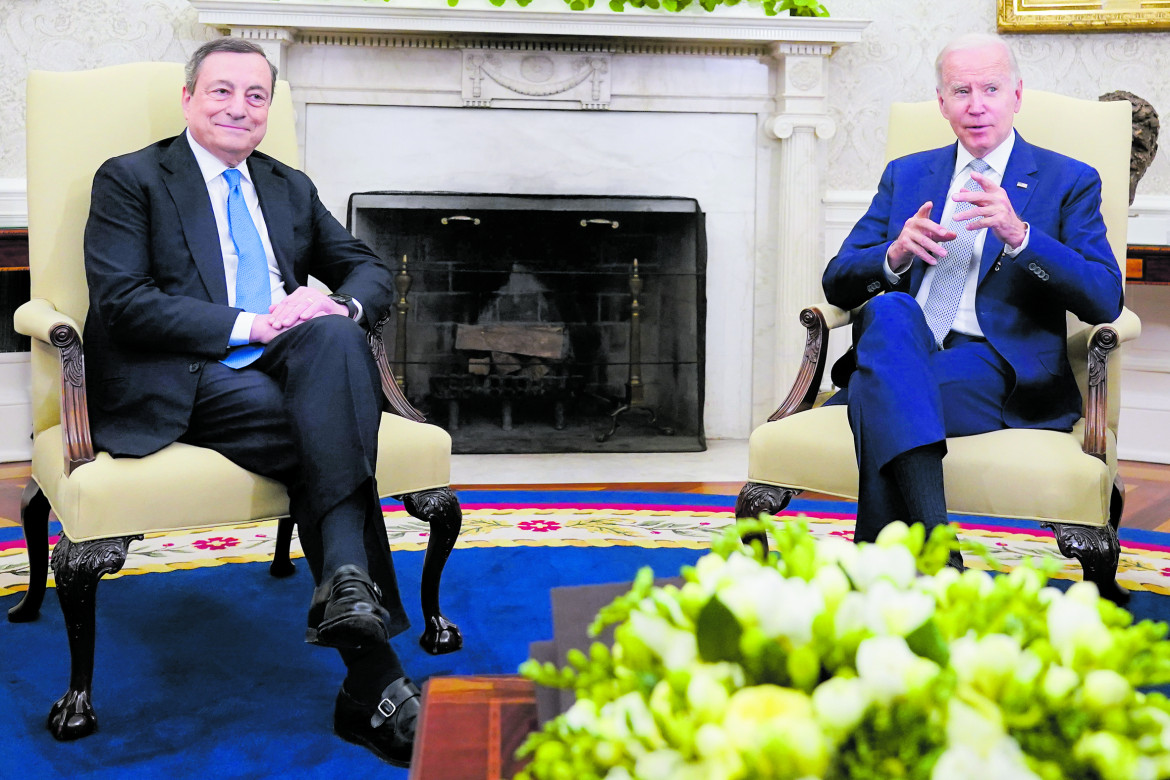Analysis
Draghi nudges Biden toward a negotiated end to the Russian war
Biden’s effusive comments to Draghi were more than mere flattery: it verges on the explicit anointment of the Italian premier as Washington’s trusted man on this side of the Atlantic.

President Biden said he “couldn’t wait” to meet Mario Draghi, and at 8 p.m. sharp he found him in the Oval Office of the White House, escorted by Ambassador Zappia and a number of advisers: Mattiolo, the diplomatic adviser; De Leverano, the military adviser; and Giavazzi, the economic adviser. On the U.S. side, they were welcomed by an all-female team: Treasury Secretary Yellen, Deputy Secretary of State Sherman and Europe Adviser Sloat. The meeting lasted exactly an hour and a half.
There was “a lot to speak about,” the president began, and the Italian got straight to the point: “in Italy and in Europe now, folks need to put a finish to these massacres — to those massacres, to this violence, this butchery that’s occurring. And folks take into consideration what can we do to deliver peace.” So, “we definitely have to make use of any direct, indirect — oblique channel of communication” with the aim to start “some credible negotiations.”
Draghi left no room for misunderstanding: on both sanctions and arms supply, Italy and the U.S. were on the same page. Putin has failed in his attempt to divide the West, and on the contrary: “the ties between our two countries have always been very strong. And, if anything, this war in Ukraine made them stronger.”
Draghi also stressed that “what happened in Ukraine is going to bring a drastic change in the European Union”: “We’ve always been close. Now we’re going to be much closer. And […] I can count on your support as a true friend of Europe and of Italy, of course.”
The host was effusive in his praise. He complimented Draghi as a “good friend and a great ally,” and highlighted that “the thing that I most appreciate about you is that our effort from the very beginning to bring NATO and the EU in lockstep — Putin really believed he could split us. […] And … we’ve all stepped up.” This is more than mere flattery: it verges on the explicit anointment of the Italian premier as Washington’s trusted man on this side of the Atlantic. Some reassurances were also offered by the American: “I believe that a strong European Union is in the interest of the United States.”
Paying great attention to nuances, with the benefit of a long personal relationship between the two, the Italian premier tried to keep in balance his position as Washington’s most reliable partner in Europe and at the same time his role as someone who can nudge the White House toward the direction of a negotiated solution instead of that of a protracted war with a long search for a knockout victory. He did it in his own style, aware of the margins for action that Italy’s position in Europe allows him – thus, in different tones than Macron – but nonetheless unequivocally.
In Rome, the PD was jubilant even before the talks were over: “Draghi’s message is clear and strong. He represents us.” However, White House spokeswoman Psaki later put a damper on any optimism resulting from the talks with Draghi: “We certainly believe that [the war] will be resolved through a diplomatic process and a diplomatic solution,” but “we don’t see a sign from the Russians that they are open to or eager to … engage in those discussions.” It sounded almost like a death knell.
Even the pleasantries and mutual flattery conveyed messages and signals. But it goes without saying that the serious discussions began behind closed doors. On the table was energy, the problem to end all problems. Biden is likely to insist on further accelerating the European effort to become independent of Russian gas, modeled on what Italy is doing, and to put the embargo back on the table – if not immediately, then at least soon.
It is certain that the Italian premier is going to bring up the issue of the cap on the price of Russian gas – his own crusade in Europe for which he is asking Biden’s support – but perhaps also of American gas. The U.S. has already guaranteed that liquid gas supplies will flow, although the first regasifier in Italy will not be ready until early 2023 and the second not before 2024. But the price is high, American gas is more expensive than Russian gas, and at such a sensitive stage this is a very big problem.
There is one more item on the agenda of the meeting that is bound to become increasingly urgent in the coming weeks and months: the food emergency. The cost of the war and sanctions in Africa is a tragic one, measured in hunger, not to mention that famine will inevitably trigger a new wave of migration to the EU. So a plan must be put in place, and the U.S. and Italy must work together to lower the price of energy to avoid the risk of food crises among poor countries.
Whatever the outcome of the talks taking place these days in the U.S., there is yet another constraint that Mario Draghi is understandably trying to downplay: the unity of the Union, put to the test on the Russian oil embargo, is less iron-clad than it appears, and in Rome the unity of the government majority is itself wavering. Draghi will speak before the Senate on May 19, but only for question time, not a real briefing, and with no possibility of a floor vote. This is the opposite of what Giuseppe Conte is loudly demanding, also joined by FdI. Sooner or later, Draghi’s cat-and-mouse game with Parliament will have to end.
Originally published at https://ilmanifesto.it/draghi-a-biden-tentiamo-la-pace on 2022-05-11
